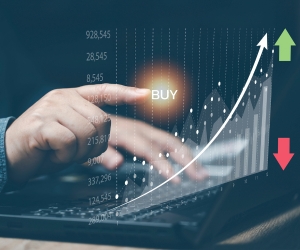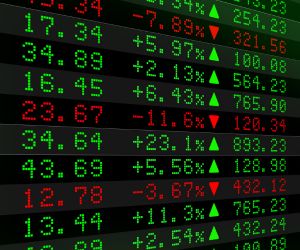adidas AG, a global leader in the sports goods industry, is known for its innovative athletic footwear, apparel, and accessories. Listed on the Deutsche Börse, adidas continues to drive performance and lifestyle products, inspiring athletes and consumers worldwide. So, is it a good investment? Are there potential risks? What investment strategy should you consider for this stock? This article will address these questions and more.

Steps to Invest in Adidas (ADS.DE)
Research and Analysis:
Adidas (XETRA: ADS) is one of the leading brands in the global sports apparel industry. Before investing, review its financial reports, its e-commerce business growth, and its expansion strategies against competitors like Nike and Puma.Opening an Investment Account:
To invest in Adidas, you need an account with a broker that allows trading on the Frankfurt Stock Exchange (XETRA). You might also consider European consumer ETFs if you prefer diversification. Typically, you'll need to provide a copy of your identification document and a utility bill (e.g., from an electricity or water company) to verify your identity and address. Compare commissions, trading platforms, and the service offered by each brokerage to choose the one that best suits your needs.Define Investment Strategy:
- Long term: Adidas has shown resilience and innovation capacity with new product lines and collaborations.
- Short term: Traders can take advantage of iconic sneaker releases and sales reports during sporting events.Execution and Monitoring:
Place the order with your broker and closely follow the demand for its products, innovations in footwear and sportswear, as well as e-commerce market trends.Portfolio Diversification:
To reduce risks, combine Adidas with other brands like Nike (NKE), Puma (PUM.DE), or consumer sector ETFs.
SWOT Analysis of Adidas as an Investment
In this SWOT analysis, we will evaluate investing in Adidas, one of the leading brands in sportswear and footwear worldwide. We identify the Strengths and Weaknesses (internal) and the Opportunities and Threats (external) that affect its position in the sports fashion industry.
Strengths:
Globally recognized brand: Adidas is a benchmark in the market for sporting goods, with a portfolio of high-demand products.
Innovation and design: Investment in cutting-edge technology and design allows it to stand out in a highly competitive sector.
Partnerships and sponsorships: Partnerships with top-tier teams, athletes, and events enhance brand visibility.
Strong presence in key markets: With extensive distribution in Europe, America, and Asia, it diversifies its revenue streams.
Weaknesses:
Dependence on fashion trends: Demand can quickly fluctuate based on consumer preferences.
Production and labor costs: Manufacturing sports goods involves managing global supply chains with cost and regulatory compliance risks.
Intense competition: Rival and emerging brands are contesting market share in the sports and lifestyle sector.
Opportunities:
Growth in e-commerce: The rise of online sales enables Adidas to reach more consumers and reduce intermediaries.
Expansion in emerging markets: Rising purchasing power in Asia and Latin America offers growth opportunities.
Innovation in sustainable products: The trend towards eco-friendly and responsible fashion can open new market niches.
Partnerships with tech brands: Collaborating with tech companies can drive the development of smart and wearable products.
Threats:
Reputation risks: Issues related to production or controversial sponsorships can affect the brand's image.
Global economic fluctuations: Crises or recessions can reduce spending on sports and fashion goods.
Changes in trade regulations: Tariff policies or import barriers can increase production and distribution costs.
What is an International Stock Broker?
An International Stock Broker is the entity (or platform) that allows you to buy and sell shares of companies listed on stock exchanges in various countries around the world. Unlike a local brokerage, the main focus of International Brokers is to offer access to global markets, such as those in the United States, Europe, or Asia.
Why do we need an International Stock Broker?
Investing in international stocks can be an excellent way to diversify your portfolio, as it gives you the opportunity to participate in the growth of economies and sectors worldwide. However, operating in global markets is not as simple as trading in the local market: it requires specific knowledge, compliance with international regulations, and the use of advanced trading platforms.
An International Stock Broker brings all these investment opportunities together in one place and allows you to access different exchanges and trading conditions, in exchange for a commission.
Examples and Comparisons:
There are several well-known International Stock Brokers, such as Interactive Brokers, eToro, TD Ameritrade, or Saxo Bank, among others. Each offers trading platforms with particular features and varying commissions according to the service. Some excel at providing market advice and analysis in multiple languages, while others may offer more competitive operating costs or social investment tools. These details allow you to choose the option that best suits your needs and investor profile.
Regulatory and Security Aspects
It is essential that the International Stock Broker you choose is regulated by recognized entities in the country where it operates, such as the U.S. Securities and Exchange Commission (SEC) in the United States, the Financial Conduct Authority (FCA) in the United Kingdom, or the Comissão de Valores Mobiliários (CVM) in Brazil, among others. This oversight ensures that the broker complies with strict security and transparency standards, providing you with greater confidence when investing your money.
How do Brokers “connect” to International Markets?
Through agreements with foreign stock exchanges and the use of advanced technological platforms, International Stock Brokers process the buy and sell orders placed by their clients. They sort transactions according to price, order of arrival, and other parameters, and charge a commission when the transaction is executed. This technological infrastructure allows operations to be carried out quickly and securely, facilitating real-time tracking of your investments.
In conclusion, an International Stock Broker is your gateway to the most important stock markets in the world. Thanks to its regulation, trading platforms, and knowledge of global markets, you can diversify your portfolio and seek growth opportunities in different sectors and countries.





